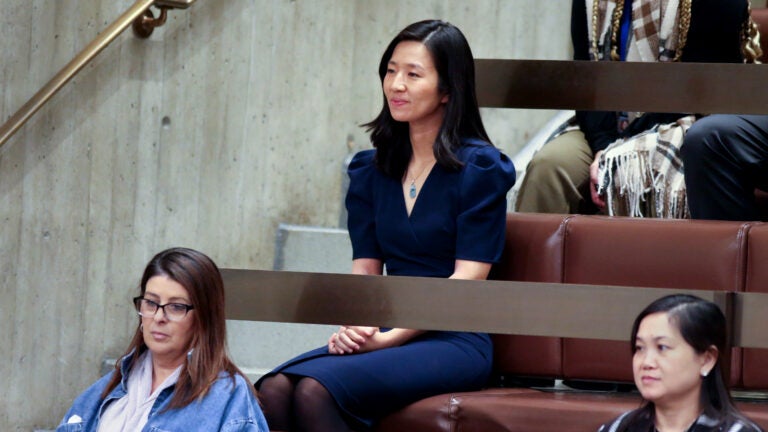Local News
Statewide rent control will likely to be on the ballot next fall, supporters say. Boston Mayor Michelle Wu wishes they were not backing a one-size-fits-all approach.

An effort to put a question about enacting statewide rent control on the ballot next fall is gaining momentum, but criticism came this week from a seemingly unlikely source: Boston Mayor Michelle Wu.
Wu has been a driving force behind other rent control initiatives, and continues to be adamant that rising housing costs are a dire problem in need of immediate attention. But the proposed ballot measure being pushed by tenants’ rights groups may be too much of a one-size-fits-all solution for Wu, she said during a radio interview Wednesday.
If enacted, the ballot measure would tie annual rent hikes across the state to cost of living increases, with a hard annual cap of 5%. Owner-occupied buildings with four or fewer units and newly constructed buildings during their first 10 years of existence would be exempt, but most apartment buildings across Massachusetts would have their rent increases capped.
Wu was asked about the topic during an appearance on GBH’s “Boston Public Radio.” Wu said that she has yet to meet with the advocacy community about this specific issue or taken a “public position.”
Housing costs are too high, Wu said, and she worries about an exodus of residents, especially young people and seniors who are being priced out of apartments in Boston.
“My belief is that housing costs are the biggest liability for the future of our city and state economy,” she said.
But Wu expressed disappointment that advocates are lining up behind a blanket statewide cap on rent increases. Different municipalities have different circumstances, she said, and local leaders should be able to make their own decisions.
“I wish that the ballot initiative had been just a pure, local option. Repeal the ban on cities taking action and let each city do what they need to do,” Wu said.
Growing support
Massachusetts voters abolished rent control in 1994. At the time, it was only in effect in Boston, Brookline, and Cambridge. As housing costs have continued to climb in recent years, various rent control or “stabilization” efforts have come and gone.
Wu campaigned for mayor on rent stabilization, and in 2023 introduced a proposal that would have capped rent increases in the city. She won the support of City Council, but the plan died in the State House.
Also in 2023, State Rep. Mike Connolly spearheaded an effort to do what Wu is now advocating for: reviving local-option rent control. It crumbled then due to a lack of support.
Organizers appear to be having more luck with the current initiative. They needed to collect at least 74,574 signatures by Wednesday and submit them for certification with local election officials. Supporters announced Tuesday that they had collected more than 124,000 signatures and are confident that the question will be placed on the 2026 ballot.
Once local officials certify the signatures, they must be submitted to the Secretary of State’s office by Dec. 3. If this happens, the measure would be sent to the state Legislature in January. Lawmakers can pass the measure, propose a substitute, or take no action. If the Legislature does not pass the measure as filed before the first Wednesday in May, organizers will have to collect some 12,000 more signatures before a final deadline next summer.
“We achieved our goals through the hard work of grassroots rent control supporters, not by paying hundreds of thousands of dollars to professional signature gathering firms. That speaks to the strong support for rent stabilization that exists all across Massachusetts, and it’s exactly how we’ll take on the corporate real estate investors who are driving up housing costs across Massachusetts to increase their profits,” said Noemi Ramos, executive director of New England Community Project, in a statement.
When contacted Wednesday, Homes for All Massachusetts executive director Carolyn Chou said that the group was on track to qualify for the December deadline, and had seen significant support from residents in every county in the state.
Asked about Wu’s comments, Chou said that organizers look forward to having future discussions with local elected officials like Wu about rent control, housing production, tenant’s rights, and more.
Supporters of the ballot measure are also riding high after several of the state’s most powerful labor unions endorsed it last month.
The Boston City Council showed mixed support for the measure when it was brought up in September. Since then, four councilors have openly endorsed it.
Finding ‘the right balance’
Real estate groups are mustering opposition to the ballot measure, arguing that rent control leads to stalled housing construction and ultimately, higher costs for renters.
Last month, the Greater Boston Real Estate Board, NAIOP Massachusetts, and the Massachusetts Association of Realtors sent a letter to mayors across the state. They called the proposal “ill-conceived” and sought to warn the mayors about the potential for negative results, per The Boston Globe.
GBRB representatives testified Wednesday at a hearing in the State House that concerned a number of pending pieces of legislation, some of which seek to enact rent control policies at the local level.
“Massachusetts must reduce barriers to housing creation and build more homes across all price points to address the housing crisis. In contrast, rent control represses housing creation and disincentivizes unit development and upkeep in our state,” the group said in written testimony submitted to lawmakers before the hearing.
Wu was asked on GBH whether she might actually push for voters to reject the ballot measure if it ends up being the only realistic way for residents to see rent control. The mayor responded by saying that she would probably “stay out” of the debate.
“It is quite restrictive,” she said of the proposed ballot measure. “We do need to be at the right balance between not chilling or preventing housing production while we are keeping people in their homes as we try to boost the supply and create more housing.”
Sign up for the Today newsletter
Get everything you need to know to start your day, delivered right to your inbox every morning.



